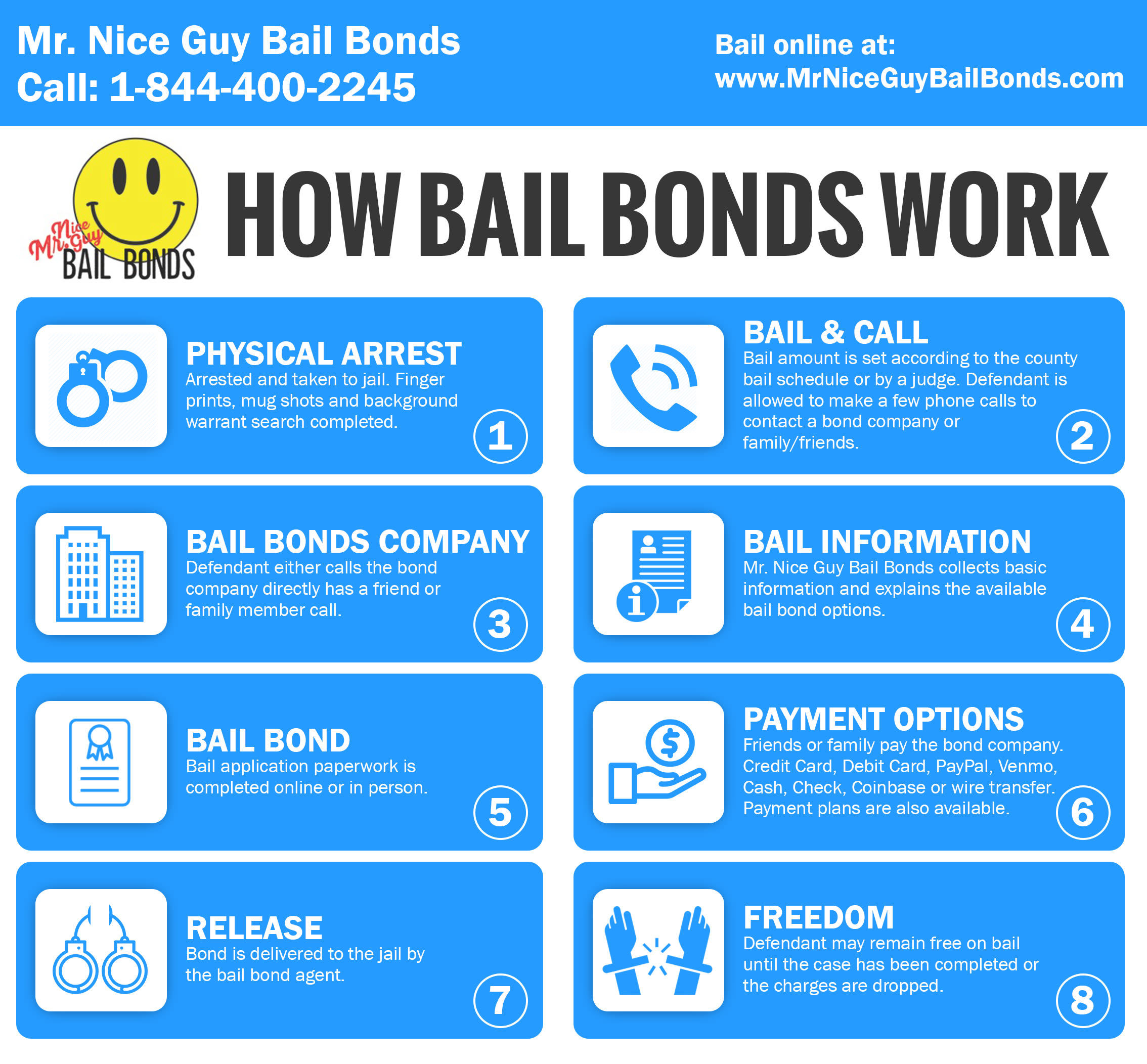Trusted Bail Bonds Montgomery County - Specialist Aid
Trusted Bail Bonds Montgomery County - Specialist Aid
Blog Article
Opening the Keys of Bail Bonds: A Thorough Summary
Browsing the intricate globe of Bail bonds can often really feel like deciphering a cryptic code, with layers of complexity that continue to be hidden to many. From the various types of Bail bonds offered to the crucial duty of a co-signer, each element plays an important component in this lawful procedure. As we unwind the internet of details bordering Bail bonds, a more clear understanding arises, losing light on the devices that underpin this system. Join us as we delve deeper into the nuanced facets of Bail bonds, uncovering the secrets that lie within and demystifying this typically nontransparent world.
Comprehending Bail Bonds Process
When facing a lawful scenario that needs publishing Bail, understanding the Bail bonds procedure is crucial to browse the intricacies of the judicial system effectively. Bail bonds function as a financial warranty to the court that the accused will appear for all called for court looks. This process entails a bondsman, who generally charges a non-refundable cost, normally around 10% of the overall Bail amount, to post the Bail in behalf of the accused.

Furthermore, security, such as building or possessions, may be called for to safeguard the bail bond. Comprehending the terms of the bail bond arrangement is important to guarantee compliance and stay clear of any type of added legal consequences. By understanding the Bail bonds process, people can make informed choices when navigating the lawful system.
Types of Bail Bonds Available
Different kinds of Bail bonds are available to people facing lawful proceedings, using options customized to specific conditions and needs. One of the most common kind is a surety bond, where a bondsman pays the complete Bail amount on part of the defendant for a non-refundable fee, normally around 10% of the total Bail. Money bonds require the full Bail total up to be paid in money before the offender can be released. Home bonds, on the other hand, entail making use of useful assets like realty as security for the Bail quantity.
Additionally, there are government Bail bonds for cases involving federal charges and migration bonds for people restrained by Migration and Customs Enforcement (ICE) Comprehending the different types of Bail bonds offered can help defendants browse the lawful procedure a lot more successfully.
Obligations of the Co-Signer

In addition, as a co-signer, you are liable for guaranteeing that the offender follows any type of conditions established by the court, such as participating in counseling or abstaining from certain activities. It is necessary to preserve open interaction with the defendant to monitor their conformity and address any type of issues immediately. Ultimately, being a co-signer includes a substantial level of depend on and duty, as you are financially and lawfully linked to the defendant's Bail responsibilities.
Effects of Skipping Bail

Avoiding Bail can have serious legal effects for both the co-signer and the accused associated with the bail bond arrangement. When a defendant falls short to show up in court as needed after posting Bail, the court normally releases a warrant for their arrest. This not only aggravates the defendant's legal problems yet also puts the co-signer in danger.
For the offender, missing Bail can result in added criminal charges, such as ridicule of court or Bail leaping, which can lead to penalties, a cancellation of Bail advantages, or even imprisonment. Additionally, the offender might shed the Bail quantity paid and any collateral offered.
If the offender misses Bail,Co-signers additionally face significant consequences. As the co-signer guarantees why not try these out the defendant's appearance in court and is financially responsible for the full Bail amount, they may be required to pay the entire Bail if the defendant absconds. This can lead to financial strain, damaged credit, and potential lawsuit versus the co-signer.
Trick Consider Bail Bond Approval
Much more significant offenses may lead to greater Bail quantities or even a rejection of Bail altogether. A background of previous convictions or a pattern of avoiding court days can raise red flags and make it more challenging to safeguard a bail bond.
Furthermore, the connections the offender has to the neighborhood can affect the approval of a bail bond. Solid neighborhood connections, such as steady work, family members links, and long-lasting residency, can work in support of the accused. On the various other hand, trip threat concerns may develop if the offender has no solid links to the neighborhood. Funds also play a considerable duty. The capability to pay the Bail quantity or provide collateral helpful resources can enhance the possibilities of bail bond authorization. Eventually, a mix of these variables is considered by the court when determining whether to approve a bail bond.
Verdict
Finally, recognizing the Bail bonds procedure, the types offered, the obligations of the co-signer, the consequences of skipping Bail, and the key consider bail bond authorization are crucial for browsing the lawful system. By familiarizing oneself with these aspects, individuals can make informed choices and make certain a smoother procedure when handling Bail bonds. It try this out is necessary to follow the standards and needs stated to stay clear of any type of prospective complications.
The most usual kind is a surety bond, where a bond bondsman pays the full Bail amount on part of the accused in exchange for a non-refundable charge, normally around 10% of the total Bail. By authorizing the bail bond contract, you are taking on the responsibility of assuring the full Bail quantity if the accused fails to show up in court - bail bonds near dayton.Skipping Bail can have severe legal consequences for both the defendant and the co-signer involved in the bail bond arrangement. The ability to pay the Bail quantity or provide security can increase the possibilities of bail bond authorization.In final thought, recognizing the Bail bonds process, the kinds available, the obligations of the co-signer, the effects of avoiding Bail, and the vital elements in bail bond authorization are essential for browsing the lawful system
Report this page